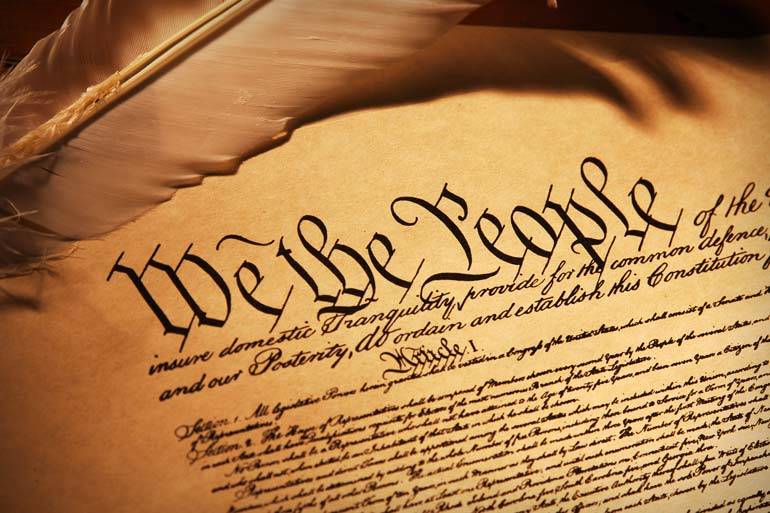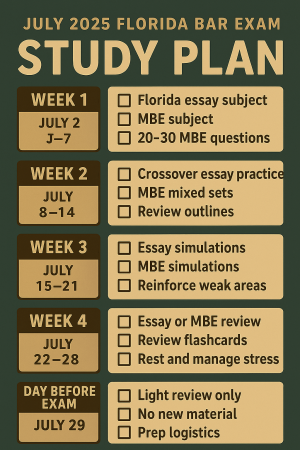Federal Constitutional Law Outline – Essay Rule of Law Statements
You can download a copy of this document at the end of the page.
(1) Standing
Article III provides that the federal courts only have jurisdiction where there is an actual case and controversy. Thus, in order to properly assert her claims in federal court, a plaintiff must have standing. There is standing where the plaintiff alleges (1) an actual or imminent injury, (2) which was caused by the defendant’s conduct, and (3) which is redressible by the court.
An association may sue on behalf of its members if (1) the members would have standing to sue on their own, (2) the interests of the litigation are germane to the organization’s purpose, and (3) the members would not need to participate in the suit.
A taxpayer has standing if (1) the law he seeks to challenge was enacted under Congress’s taxing and spending power, and (2) he alleges that Congress has exceeded some specific limitation on that power.
↑ Back to Top ↑
(2) Ripeness
For proper federal jurisdiction, the claim must be ripe for review. A claim is ripe where the plaintiff would suffer harm if review were denied.
(3) Mootness
For proper federal jurisdiction, there must be an actual controversy at every stage of the litigation. Thus if events after the filing of the lawsuit end the plaintiff’s injury, the claim should be dismissed as moot. However, there is an exception to the mootness doctrine where the wrong is capable of repetition yet evading review, or where the defendant has voluntarily ceased the conduct which caused the plaintiff’s harm.
(4) State Sovereign Immunity
The 11th Amendment prohibits private individuals from bringing suits in federal courts against state government. However, a state may waive its sovereign immunity. Also, the 11th Amendment does not bar suits against state officers for injunctive relief. Moreover, Congress may abrogate SSI under sec. 5 of the 14th Amendment when it is acting to remedy / prevent an already recognized constitutional violation, and when the law is proportional and congruent to the constitutional violation.
↑ Back to Top ↑
(5) Dormant Commerce Clause
The Commerce Clause gives Congress plenary power to regulate interstate commerce. However, where Congress is silent on an issue, the states are free to regulate local transactions affecting interstate commerce. But, state regulations that unduly burden interstate commerce are unconstitutional.
Where a state regulation discriminates against out-of-staters, there is a presumption that the regulation unduly burdens interstate commerce. Thus, the state must show that the regulation is necessary to serve an important government interest and that there are no less restrictive means available. However, there is an exception when Congress has approved the regulation or where the state is acting as a market-participant.
Where the state regulation is non-discriminatory, the Court will balance the state’s interest in maintaining the regulation against the burden on interstate commerce.
(6) Privileges and Immunities Clause
The Privileges and Immunities Clause of the 4th Amendment prohibits a state from denying non-citizens the privileges and immunities afforded to its own citizens. Thus a state or local law which discriminates against out-of-staters with regards to civil liberties or an individual’s ability to earn a living will be struck down as unconstitutional unless the state demonstrates that the law is necessary to serve an important government purpose. But, the P&I clause does not apply to corporations or aliens.
↑ Back to Top ↑
(7) State Action
The 14th Amendment only applies where there is action by the state or local government, or by an individual who is performing a function that is traditionally performed exclusively by the state.
(8) Equal Protection
The Equal Protection Clause of the 14th Amendment prohibits state governments from denying any person within its jurisdiction the equal protection of the laws. While the 14th Amendment applies exclusively to state governments, grossly unreasonably discrimination by the federal government is prohibited by the Due Process Clause of the 5th Amendment. Under either provision, the analysis is the same.
To successfully assert an equal protection claim, the plaintiff must first show that she is a member of a class of persons who is being treated differently from others. The discrimination may appear on the face of the law, or where the law is facially neutral, the plaintiff must show that there is both a discriminatory intent for the law and a discriminatory impact for the law.
Where there is a classification, the level of scrutiny to be applied depends on the classification at issue or the right being limited.
Classifications based on race, national origin, or alienage generally must meet strict scrutiny – necessary to achieve a compelling government purpose. So must regulations which implicate a fundamental right – travel, voting or Free Speech.
Classifications based on gender or illegitimacy must meet intermediate scrutiny – substantially related to an important government purpose.
Where the law does not affect a suspect class nor implicate a fundamental right, the law need only meet rational basis review. That is the challenger must demonstrate that the law is not rationally related to a legitimate government interest (e.g., age, disability, wealth, and other classifications).
↑ Back to Top ↑
(9) Procedural Due Process
The Due Process Clause of the 14th Amendment requires that a state provide its citizens fair process and procedures before the government may deprive one of life, liberty or property interest. Procedural due-process invokes a two-step inquiry.
First, there must be a deprivation of life, liberty, or property. There is a liberty deprivation when the state takes away a significant freedom secured by the Constitution or statute. There is a property deprivation when the state takes away an entitlement to the continued receipt of a benefit. Note also that the deprivation must be intentional or at least reckless. A deprivation that results from negligence is an insufficient basis for a procedural DP violation.
If there is a deprivation, the next step is to consider what process is due. Here, the court will balance (1) the importance of the interest to the individual, (2) the ability of additional procedures to increase the accuracy of the fact-finding process, and (3) the government’s interest in fiscal and administrative efficiency.
The final step is to consider whether the government has provided the appropriate process.
(10) Substantive Due Process
Where the law limits the ability of all persons to engage in an activity, substantive due process may apply. The Due Process Clause of the 5th Amendment applies to the federal government, which the due process clause of the 14th Amendment applies to the states. The inquiry is whether the government has an adequate reason to take away a person’s life, liberty, or property interest.
Here, the analysis depends on the right being impaired. Where the law limits a fundamental right, such as the right to vote, travel, privacy or freedom of speech, strict scrutiny applies. In all other cases, the rational basis test applies.
↑ Back to Top ↑
(11) Free Speech
A law that seeks to regulate speech is presumptively unconstitutional. To justify content-based regulation of speech, the government must show that the ordinance is necessary to serve a compelling state interest and it is narrowly drawn to achieve that end. [Discuss whether the regulation is content-based]
Content-neutral regulations on speech are subject to intermediate scrutiny and will be upheld if the government can show that (1) they advance an importance interest unrelated to the suppression of speech, and (2) they do not burden substantially more speech than necessary to further those interests.
a. Time, Place, and Manner Restrictions
To be valid, government regulation on speech in public forums must be (1) content-neutral, (2) narrowly tailored to serve a significant government interest, and (3) leave open alternative channels of communication.
Regulations on speech in designated public forums – places where the government could close speech, but chooses to open – must meet the same standard as applies to public forums.
Regulations on speech in private forums must (1) be viewpoint neutral and (2) reasonably related to a legitimate government interest.
b. Prior Restraints
Prior restraints on speech must meet strict scrutiny. The restraint must be necessary to serve a compelling government interest.
c. Vagueness & Overbreadth
A law is unconstitutionally vague if a reasonable person cannot tell what speech is prohibited and what is allowed. A law is unconstitutionally overbroad if it regulates substantially more speech than the constitution allows.
d. Symbolic Speech
The government can regulate conduct that communicates if it has an important interest unrelated to suppression of the message and if the impact on communication is no greater than necessary to achieve the government’s purpose.
e. Commercial Speech
Commercial speech that inherently risks deception is not protected by the First Amendment, so the government may regulate such speech as it pleases. Regulations on commercial speech that is not inherently deceptive must meet intermediate scrutiny.
f. Obscenity
Obscene speech is not protected by the First Amendment. Speech is obscene if (1) it appeals to the prurient interest, (2) the material is patently offensive under the law prohibiting obscenity, and (3) taken as a whole, the material must lack serious redeeming artistic, literary, political, or scientific value.
↑ Back to Top ↑
(12) Freedom of Association
Laws that prohibit or punish group membership must meet strict scrutiny. To punish group membership, the government must prove that the person (1) actively affiliated with the group, (2) knowing of its illegal activities, (3) with the specific intent of furthering those illegal activities.
(13) The Free Exercise Clause
The Free Exercise Clause prohibits the state from imposing restrictions on someone on the basis of the person’s religious beliefs. The state may impose a restriction if it necessary to achieve a compelling state interest. However, the Free Exercise Clause cannot be used to challenge a neutral law of general applicability.
(14) The Establishment Clause
The Establishment Clause prohibits laws respecting the establishment of religion. If government regulation or activity gives preference to one religious sect over another, it is invalid unless it is narrowly tailored to serve a compelling state interest.
If a government regulation or action contains no sect preference, it is valid under the Establishment Clause if (1) it has a secular purpose, (2) it neither advances nor inhibits religion, and (3) it does produce excessive governmental entanglement with religion.
↑ Back to Top ↑
(15) Taking
The government may take property, though the power of eminent domain, but only if (1) it does so for the public use, and (2) it provides just compensation to the owner. Physical takings must meet this test, as must use restrictions which deprive the owner of all economic value.
(16) Contracts
The Contracts Clause prohibits state or local interference with existing contracts. Interference with government contracts must meet strict scrutiny. Interference with private contracts must meet intermediate scrutiny.
(17) State Taxation
Where state taxation laws conflict with federal laws, the state laws are preempted by the Supremacy Clause. Discriminatory taxes are invalid under the Commerce Clause. Where a state tax law is not preempted and is not discriminatory, it will be upheld if (1) there is a substantial nexus between the activity and the state, and (2) state tax on interstate businesses must be fairly apportioned.
(18) Access to Courts
A state must waive court filing fees imposed on indigents when the imposition of a fee would deny a fundamental right to the indigent. The inability to pay a fee cannot be the sole basis upon which a person is deprived of a fundamental constitutional right. (Raises equal protection issue – discrimination based on wealth; but note, access to courts is not a fundamental right).
↑ Back to Top ↑
Download: Federal Constitutional Law Essay Outline
Copyright © Aplus eBooks Publications – All Rights Reserved
Copyright © Aplus eBooks Publications – All Rights Reserved
Permalink: https://www.aplusebooks.com/fed-con-law-essay-rules-of-law/




